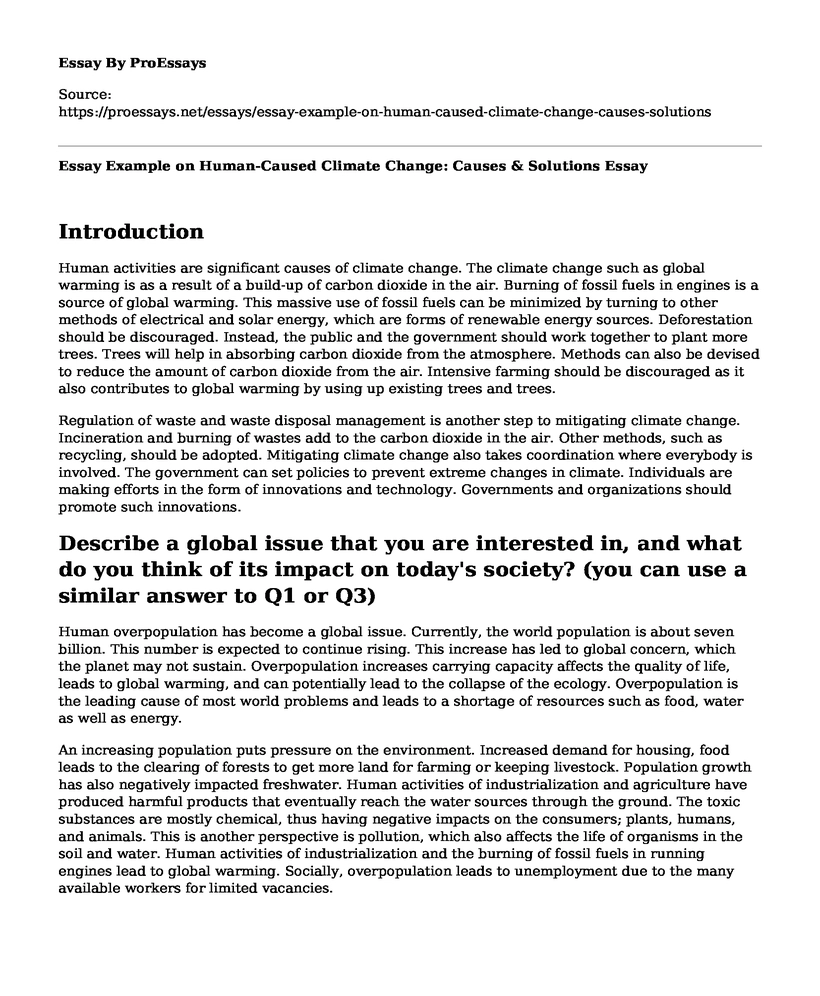Introduction
Human activities are significant causes of climate change. The climate change such as global warming is as a result of a build-up of carbon dioxide in the air. Burning of fossil fuels in engines is a source of global warming. This massive use of fossil fuels can be minimized by turning to other methods of electrical and solar energy, which are forms of renewable energy sources. Deforestation should be discouraged. Instead, the public and the government should work together to plant more trees. Trees will help in absorbing carbon dioxide from the atmosphere. Methods can also be devised to reduce the amount of carbon dioxide from the air. Intensive farming should be discouraged as it also contributes to global warming by using up existing trees and trees.
Regulation of waste and waste disposal management is another step to mitigating climate change. Incineration and burning of wastes add to the carbon dioxide in the air. Other methods, such as recycling, should be adopted. Mitigating climate change also takes coordination where everybody is involved. The government can set policies to prevent extreme changes in climate. Individuals are making efforts in the form of innovations and technology. Governments and organizations should promote such innovations.
Describe a global issue that you are interested in, and what do you think of its impact on today's society? (you can use a similar answer to Q1 or Q3)
Human overpopulation has become a global issue. Currently, the world population is about seven billion. This number is expected to continue rising. This increase has led to global concern, which the planet may not sustain. Overpopulation increases carrying capacity affects the quality of life, leads to global warming, and can potentially lead to the collapse of the ecology. Overpopulation is the leading cause of most world problems and leads to a shortage of resources such as food, water as well as energy.
An increasing population puts pressure on the environment. Increased demand for housing, food leads to the clearing of forests to get more land for farming or keeping livestock. Population growth has also negatively impacted freshwater. Human activities of industrialization and agriculture have produced harmful products that eventually reach the water sources through the ground. The toxic substances are mostly chemical, thus having negative impacts on the consumers; plants, humans, and animals. This is another perspective is pollution, which also affects the life of organisms in the soil and water. Human activities of industrialization and the burning of fossil fuels in running engines lead to global warming. Socially, overpopulation leads to unemployment due to the many available workers for limited vacancies.
Poverty is still widespread in this century. What could the public do?
Poverty is a significant problem in the world. Poverty leads to human suffering. The governments, as substantial stakeholders in their respective countries, should develop and execute policies for growth and economic sustainability. These policies should be developed and implemented in areas such as nutrition, health, education, and employment. Agriculture should be encouraged. Farming in crops and animals creates work, generates income, and grows industries. Countries should also engage in trade as a way to stamp out poverty. Trade leads to prosperity and development. With business, countries exchange commodities and create employment.
The creation of jobs and improving access to the jobs promotes growth and income generation and hence reduction in poverty. Employees also get the opportunity to develop the skills of an entrepreneur. Another method is to provide access to social services to all the people. Access to education, for instance, allows professionalism, the gain of knowledge and skills, which are essential for employment. For people already living in poverty, they should be provided with ways to earn and support themselves. This can be effectively achieved through the removal of all barriers to development and access to technology and innovation.
Cite this page
Essay Example on Human-Caused Climate Change: Causes & Solutions. (2023, Mar 26). Retrieved from https://proessays.net/essays/essay-example-on-human-caused-climate-change-causes-solutions
If you are the original author of this essay and no longer wish to have it published on the ProEssays website, please click below to request its removal:
- Volcano Case Study: Mount Merapi
- Research Paper on Global Water Shortage
- How Earthquakes are Predicted Using Geological Data
- Pollution Threatening Biodiversity: Global Warming & Microplastics - Essay Sample
- Air Pollution: A Crisis More Deadly Than Any Pandemic - Essay Sample
- Essay Sample on Hurricanes: Mighty Storms From Low-Pressure Systems
- Essay on Everglades Restoration: A Decade-Long Process of Environmental Restoration







